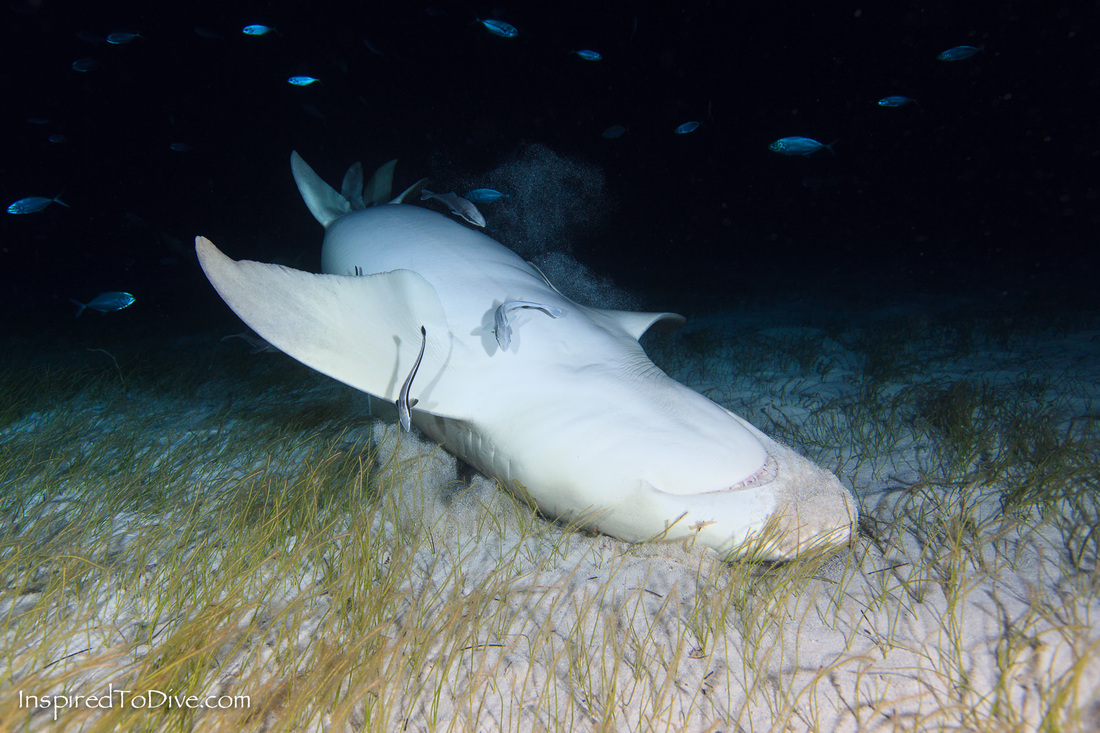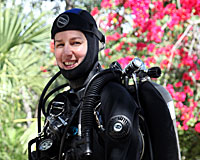Death by lemon shark - it would make an interesting tombstone.
Scuba diving at night with sharks; it's exhilarating, or the stuff of nightmares depending on your point of view. Enveloped by inky blackness as the sun steers below the sea, the water gets thicker, the sharks move faster and it's hard to see them coming. So it seems.
For an underwater photographer fascinated by sharks - it's the best and the worst. Flashes of velvet white belly against a silk curtain of jet-black; there must be some great pictures there for the taking: if you can get a focus lock on your camera in the low light, if you can see your subject coming, if your model and its toothy grimace aren't crash landing at your feet in a cloud of silt.
Mid-water, at speed, a lemon shark is bearing down on me. It's a robust, medium shark with a generous girth. A shark of this size doesn't make you think about being cautious, survival instinct means you are. Something doesn't feel right. I have been approached by lemon sharks. They look like rotund grey hovercrafts suspended a couple of inches off the sand. This one looks like a barreling train, and its monorail leads right to my head.
I'm convinced collision is imminent. Momentary panic. Heart racing. Is this shark really going to hit me? Without warning, like a plane mysteriously shot from the sky, the shark flips belly up, dives and crashes nose first into the sand.
I fired off one shot.
It was vexing behaviour. I'm not a marine biologist, I can only speculate. Driven mad by a parasitic itch? They’re so hard to scratch when you don’t have hands. Looking to shake off the relentless swarm of remoras around its head? It was a passing shark, I didn't ask it. I slumped back astonished. Then swam off, inspired for more harmless night diving encounters with sharks.
Scuba diving at night with sharks; it's exhilarating, or the stuff of nightmares depending on your point of view. Enveloped by inky blackness as the sun steers below the sea, the water gets thicker, the sharks move faster and it's hard to see them coming. So it seems.
For an underwater photographer fascinated by sharks - it's the best and the worst. Flashes of velvet white belly against a silk curtain of jet-black; there must be some great pictures there for the taking: if you can get a focus lock on your camera in the low light, if you can see your subject coming, if your model and its toothy grimace aren't crash landing at your feet in a cloud of silt.
Mid-water, at speed, a lemon shark is bearing down on me. It's a robust, medium shark with a generous girth. A shark of this size doesn't make you think about being cautious, survival instinct means you are. Something doesn't feel right. I have been approached by lemon sharks. They look like rotund grey hovercrafts suspended a couple of inches off the sand. This one looks like a barreling train, and its monorail leads right to my head.
I'm convinced collision is imminent. Momentary panic. Heart racing. Is this shark really going to hit me? Without warning, like a plane mysteriously shot from the sky, the shark flips belly up, dives and crashes nose first into the sand.
I fired off one shot.
It was vexing behaviour. I'm not a marine biologist, I can only speculate. Driven mad by a parasitic itch? They’re so hard to scratch when you don’t have hands. Looking to shake off the relentless swarm of remoras around its head? It was a passing shark, I didn't ask it. I slumped back astonished. Then swam off, inspired for more harmless night diving encounters with sharks.



 RSS Feed
RSS Feed

